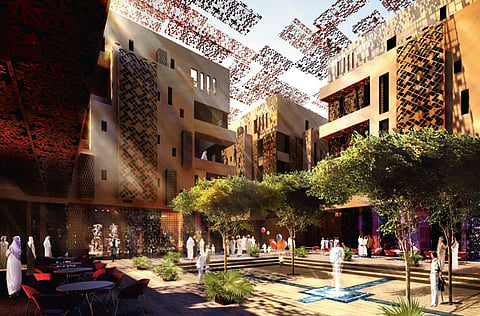Towards a green partnership
Eco building programme, Bayer offers developers sustainable development solutions

While sustainable construction is often a topic of discussion, rarely does one come across an approach involving a number of stakeholders to make the concept work effectively. Bayer Material Science recently launched its Eco-Commercial Building Programme (ECBP) in the UAE, in an effort to pair the firm's considerable scientific and manufacturing experience with a selection of regional partners with local knowledge.
"Sustainable construction is not a vision of the far future," explains Dr Thomas Baig, vice-president in charge of the ECBP, "many solutions do exist today already, but these usually only cover single aspects of green buildings. If you want to make a real difference you have to combine the bits in a smart way, and this is exactly what we want to do with the Eco-Commercial Building Programme."
An information bank
By partnering with a variety of stakeholders in the Middle East, Bayer has created an information pipeline that developer's can tap for bespoke sustainable development strategies that are tailored for their local supply chain and climate.
According to Dr Baig, the ECBP provides access to a cross section of professionals with proven track records in the region: "It's a blend of construction products suppliers, planners, engineers and architects because it is essential to incorporate these aspects in a very early stage... it's not efficient to erect a building and then adjust add a lot of [solar panels]. It actually starts with the basic orientation of the building on the site, making sure that windows are in the right position in terms of shadowing and light, which reduces energy demand from the outset."
Solution provider
While the ECBP has a commercial component, Stephan Rosenthal, managing director, Bayer Middle East, clarifies that "the ECBP is not a commercial programme per se; it's part of our commitment as an industry leader to provide solutions, and to provide [developers and other stakeholders with] opportunities to realise their objectives."
Among Bayer's Middle East network partners are several regional firms, including Building Components Solutions (BCOMS), a leading construction materials company in the Middle East, manufacturing pre-insulated sandwich panels for roof and wall insulation; Planquadrat Middle East, an architectural practice specialised in sustainable town planning and structural engineering, and SAT Insulation Materials Industry, a subsidiary of SAT Group based in Dubai. Bayer's Eco-Commercial Building Programme also signed a strategic partnership agreement in sustainable construction with Masdar City in January last year.
"This initiative stands for state-of-the-art materials, systems, and technologies in sustainable construction," offers Dr Baig. "But we go one crucial step further with a holistic approach that includes planning and engineering as well."
Here in Dubai, Bayer Material Science's joint venture system, BaySystems Pearl, supplies thermal insulation solutions based on a rigid polyurethane foam core, which help to reduce heat gain while trapping HVAC cooled air in.
Feroz Saleem, managing director of BaySystems Pearl, explains how the ECBP empowers his team, while providing an example of how the programme will function in practice. "BaySystems Pearl can call on the expertise of the global Bayer MaterialScience systems house network and take advantage of the cutting-edge technology that it offers. This means we can implement customer requirements quickly and with outstanding flexibility," he says.
Global projects
Founded in Germany in 2009, the ECBP has established its effectiveness through pilot projects across the globe, including an emissions-neutral children's day care centre in Monheim, Germany, which received the ‘Energy-Optimised Construction 2009' award from the German government.
Other projects include a green office building in Diegem, Belgium and a solar-powered, net-zero-energy, net-zero-emissions conference centre in Pittsburgh, United States.
"We have established several reference buildings across the globe in different climate zones, and they are tangible proof that environmentally friendly, energy-efficient and economic buildings can be realised with today's technology," says Dr Baig.
In explaining the impetus forthe ECBP, Dr Baig cited researchby Deutche bank showing that "40 per cent of energy consumption is due to buildings, and because of that, buildings cause 30 per cent of greenhouse gas admissions world wide."
Additionally, according to the recent WWF Living Planet Report 2010, three Gulf Cooperation Council (GCC) nations are on the top ten list of nations with the highest ecological per capita footprint in the world.


